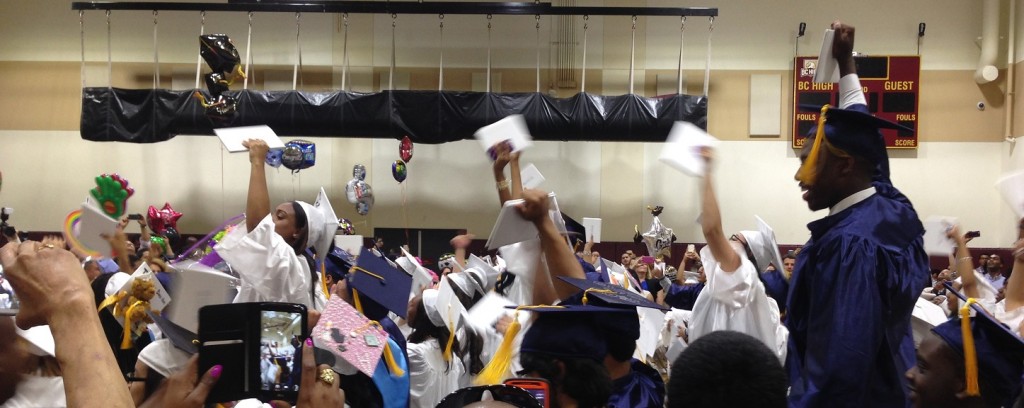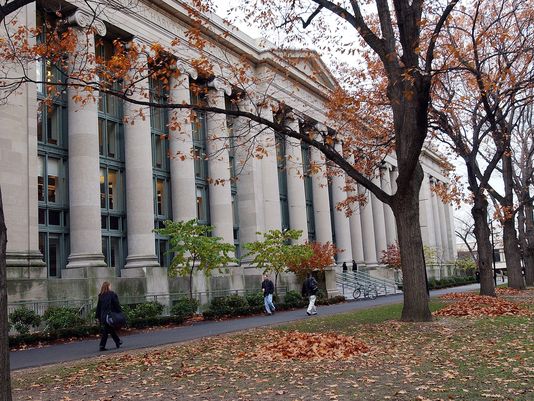A girl grows up on food stamps and becomes an engineer. New research shows why.
Educators have long struggled to help students like Tiaja Harley earn bachelor’s degrees, the surest route to the middle class. Raised by a single mother who earned minimum wage, Harley loved to read and was good at math and science in elementary school. Students like her do get into college, but the vast majority drop out.
Now a growing body of research and fresh data show that social and emotional gaps, rather than academic ones, are holding back many bright students, especially children of color. Give them some of the tools of the privileged — early and steady involvement with the professions and professionals — and many will not only get into college but through it.
This approach is gaining currency as it attracts support from philanthropists. Wall Street executives such as Rick Rieder, a chief investment officer at BlackRock Inc., have signed on. So has the Bill & Melinda Gates Foundation, which has spent $120 million on programs linking schools more directly to careers for low-income students.
Anthony Jack, a Harvard sociologist who has studied first-generation students at elite colleges, said his research confirms the value of these initiatives.
“Lower-income students come to college without practice at close relations with professional adults,” noted Jack, who was a low-income, Black undergraduate at Amherst. “Their parents’ jobs rely on not making a fuss. That’s how you keep a job like being a janitor. But these kids are thrown into an environment where they are expected to vocalize and connect.”
Early results from a range of school systems — charter, parochial and public — are striking. From a third to one-half of the high school graduates finished college in six years. That’s approaching the rate of students from the top 25% of families socioeconomically, and it’s two to four times better than those from the poorest. Harley is among those who succeeded.
“I wasn’t raised to have a profession,” said Harley, now 24. After many internships and mentoring, she very much does — as a construction engineer.
Cristo Rey, a national network of 37 Catholic schools founded in Chicago, happened on that solution in the 1990s. It found part-time jobs for its low-income Latino students to help pay tuition. The experience and mentoring turned out to be as important as the paycheck.
“We had no idea that we had stumbled upon a brilliant educational move,” said Father John Foley, the founder. “By going downtown to an office building and spending a day a week working, their self-esteem went through the ceiling.”
The national KIPP network, backed by Walmart Inc.’s Walton family and Gap founders Doris and Donald Fisher, has had a similar experience with internships and mentoring. So has Uncommon Schools, founded by Norman Atkins, a former executive with the Robin Hood Foundation, a favorite Wall Street charity.
Harley’s trajectory illustrates the promise of the approach. In fifth grade, she enrolled in Newark’s North Star Academy, where BlackRock offers guidance and job experience to students, and Rieder chairs the board. It’s part of Uncommon’s network of 55 schools in New York, New Jersey and Massachusetts.
Before she was 10, Harley had already made her way through some of the Twilight Saga and other books. But she faced daunting challenges. No one in her family had gone to college. Her mother, a home health aide, moved yearly to flee gang violence. They depended on food stamps and subsidized housing. Harley suffered from a spine ailment and later, migraines, anxiety and depression.
Harley’s new school focused on helping her recognize her professional potential. Starting in eighth grade, she spent time every summer at Rutgers University, where she built paintball guns, pinball machines and solar heaters in an engineering program.
North Star rewarded good students with college trips. At 11, Harley visited Washington, where she saw Georgetown and George Washington universities. The next year, her class went to the Florida Everglades and to nearby college campuses.
By the time she was a high school senior, Harley had visited dozens of schools. All along, in addition to tracking its students, North Star closely studied success rates for first-generation students at various colleges in preparation for sending more alumni.
After her junior year, Harley joined an additional program, All Stars, which featured an internship in the Newark office of the Port Authority of New York and New Jersey. Glenessa Gordon, an executive and one of the few female civil engineers there, saw her promise. Like Harley, Gordon is Black.
“I had to create a budget and interview other engineers,” Harley said. “She pushed me on college and career. She made me write a paper on why I wanted to be a civil engineer.”
In part, North Star encouraged such interactions to prevent a common feeling from plaguing underprivileged students: a sense that they don’t belong.
Stanford University sociologists Gregory Walton and Geoffrey Cohen coined the concept of “belonging uncertainty.” When Black students at an elite college have a bad day, they tend to assume that they’re in the wrong place, whereas White students shrug it off.
No one played a bigger role in helping Harley gain a sense of herself than Anna Taylor, a former teacher assigned by North Star to be her mentor and coach. (Taylor now oversees a staff of such coaches.)
“Anna’s my second mother,” Harley said. “I don’t know where I’d be without her.”
In 2014, Harley won a full scholarship to the New Jersey Institute of Technology, where Gordon, the Port Authority mentor, had earned her degree.
In an earlier era, Uncommon Schools would have declared its mission accomplished — not so for Harley and her cohort of classmates.
The charter network paid for her college books, the kind of expense that can easily send low-income students off track. And that was just the beginning.
In her freshman year, Harley’s dream almost fell apart. Her family moved away from New Jersey, so she no longer qualified for a resident scholarship. Harley called her mentor, who worked with state and college officials to have Harley declared a resident while still a minor.
When dorms were closed, Harley sometimes had nowhere to stay. She crashed on Taylor’s couch, babysitting for her mentor’s daughter in exchange.
Throughout college, Harley used all the skills she learned at North Star — advocating for herself, emailing professors and visiting them during office hours. One semester, when she was doing poorly in a class and felt the professor wasn’t sympathetic, she went to the dean and lobbied to withdraw and take a replacement class the following summer.
Harley wrapped up her finals in 2018 with a 3.3 GPA and a batch of recommendations. She had a B.S. in civil engineering and a plan to start her own construction company.
Her success was no fluke: Some 58% of Uncommon high school graduates are now completing college within six years, up from 43% a decade ago.
Harley’s commencement speaker, Leah Hope Jamieson, cited the late Nelson Mandela: “Education is the most powerful weapon to change the world.”
Still, Harley’s success couldn’t protect her from a pandemic. Since graduating, she has lost engineering jobs, including a $60,000-a-year position that ended because of Covid.
One thing stayed constant: She knew how to bounce back and where to turn.
Two years ago, she was jobless and without her family in Newark. She found a stint as a substitute math teacher. Her employer: Her alma mater, Uncommon Schools’ North Star.
Written by Ethan Bronner
This article originally appeared in Bloomberg on March 22, 2021.


